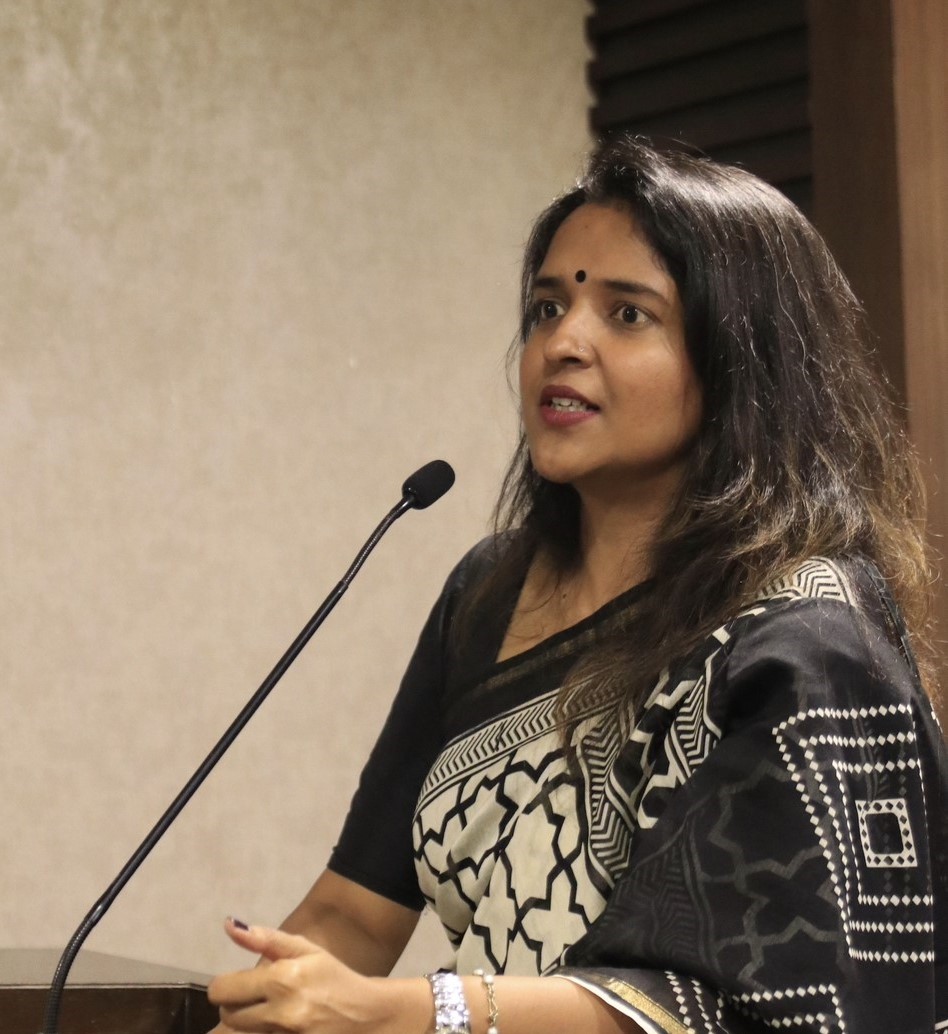This interview has been published by Namrata Singh and The SuperLawyer Team

Your journey from being an Intellectual Property Counsel in law firms to your current role as Legal Counsel at HP Indiac. is quite impressive. Could you take us on a brief tour of your career path, highlighting key milestones and what inspired your transition to the diverse legal roles you’ve undertaken?
To say the least, the journey from an Intellectual Property Lawyer to that of an In-house counsel has been dramatic with various challenges during the transition. Being a lawyer has always been my aspiration and I had decided quite early on that I wanted to be a lawyer. I went through the same grunt of attending coaching sessions for the law entrance exams, getting into one of the prestigious colleges in the country and starting my legal career. Just like any other freshly graduated lawyer, I started my career as a litigating lawyer and realized early on that litigation is not my cup of tea. This was a huge setback as I was sure that I wanted to be a lawyer. With this inability to fit myself in the litigation landscape, came self-doubt and a fear that maybe I took the wrong choice. I was at crossroads, where at one side I believed I was inept, and the other was a constant nigger within me that I am at the right place. It’s important to recognize that setbacks and doubts are natural parts of any career journey, but it is also important to remember that the legal profession isn’t limited to only litigation; rather offers a wide range of roles and specialities and finding the right fit often involves exploration and experimentation. This realization and acceptance are a valuable insight that guides you towards a more fulfilling career direction.
At that point, I started exploring my other options in the legal profession and came across the practice of Intellectual Property Rights. When I started my role as an IPR lawyer, I had no clue on the depths and potential of this subject. The significance of Intellectual Property Rights was not completely recognized by companies and as IPR lawyers, we often found ourselves at the intersection of law, technology, and business, helping companies protect their intangible assets. The scope was not limited to just providing legal advice but played a crucial role in educating clients about protecting their intellectual property rights and the potential benefits it can offer in terms of innovation, competitiveness, and revenue generation.
As a next step, there was a need to challenge myself and break out my comfort zone despite being a settled IPR lawyer. Transitioning to an in-house counsel role undoubtedly presented new challenges, especially with the lack of experience in handling compliance of a company, but the trick was to approach this challenge with courage and determination. Moving from a specialized role to a broader role required adaptability, willingness to learn and the ability to grasp new concepts and responsibilities all of this while parallelly handling internal conflicts like self-doubt and imposter syndrome. I tag this transition as one of the toughest phase of my professional journey but embracing new challenges and stepping out of one’s comfort zone is often where the most significant growth occurs, and I believe I have embraced this mindset wholeheartedly.
In your role at HP Inc., you’re involved in day-to-day operational work and deal support across different Business Units. Could you give us a glimpse into your daily work routine, highlighting key aspects of your responsibilities and the challenges you often face in managing the legal aspects of the company’s operations?
As an in-house counsel, you are not just a legal advisor but also a strategic partner to the Business, and the role extends beyond providing legal advice to actively contributing to the company’s success and growth. The dynamic nature of the business environment means that your day-to-day responsibilities can vary widely, and you must be prepared to adapt quickly to changing priorities and unforeseen challenges. Unlike a law firm setting where tasks may be more structured and predictable, as an in-house counsel the need is to be more flexible and responsive to the needs of the Business.
The key aspect is to understand not just the legal implications of decisions but also the broader business context in which those decisions are made. This requires an in-depth understanding of the company’s goals, operations, and industry dynamics as well as the ability to balance legal considerations with practical business realities.
Balancing the needs of the Business with imperative legal compliance is indeed a common challenge for in-house counsels. It is natural for the Business to prioritize growth, innovation, and profitability but it is the responsibility of the in-house counsels to ensure that these objectives are pursued within the bounds of law and ethical standards. When Businesses express frustration about legal constraints hindering their operations, it is important for in-house counsels to engage in open communication and foster a collaborative approach. One important aspect that can help to ease this balancing act includes collaborating early on, by being proactive instead of reactive, in-house counsels should encourage the Business to engage with legal counsels early in the planning stages of the projects or initiatives. Through this, legal counsels can help identify issues upfront and ask the business to address these challenges promptly. Another important consideration for in-house counsels is to provide practical solutions. Instead of simply saying “no” to business requests, in-house counsels should work with stakeholders to find creative solutions that achieve their objectives while mitigating legal risks. This also involves structuring documentation and transactions in such a way that minimizes legal exposure or implementing compliance procedures that streamline operations without sacrificing legal integrity. This helps in navigating business needs with legal compliance and fostering a collaborative environment where both objectives can be met harmoniously.
Beyond your corporate role, you’re actively involved in education and mentorship. How do you balance your professional commitments with your passion for teaching law to aspiring students and guiding underprivileged students toward career opportunities?
I am deeply committed to the cause of education and have a strong belief in its transformative powers. I look at it not only as a means of personal advancement but also as a tool for societal progress and change. The role of mentors and teachers has evolved in the present day. With the proliferation of information and access to diverse perspectives, students are more empowered to question and engage in critical discussions with their mentors. This shift presents an opportunity for mentors to adapt to the modern approach. Emphasizing realistic examples and connecting theoretical concepts with practical scenarios is indeed crucial for students to understand the relevance and applicability of their curriculum.
Balancing professional commitments with a passion for teaching can be surely challenging, but dedication towards this cause is the driving force. The passion of bringing about change, and not something at a large level but a perspective that even influencing one person’s life can have a ripple effect that creates a bigger positive change. This mindset stems from an understanding of the power of education to transform individuals and communities.
It is important to acknowledge the sacrifices and challenges that come with juggling multiple commitments, but the moments of fulfilment and gratitude, such as when a student expresses appreciation, makes it all worthwhile. These moments serve as a reminder of the profound impact that educators can have in the lives of their students. Having a strong support system is invaluable in navigating the demands of both professional life and continuing one’s passion. There have been instances where I have worked for all 7 days a week, it is in those moments when you feel if you’re doing the right thing. My family has been my strongest support system. While I have been away, they have managed everything at the backend. I feel extremely privileged and grateful to have such a support system, which I am mindful that many people do not have. It is important to recognize that not everyone has access to the same resources and support networks and acknowledging this privilege imbibes empathy and a commitment to create opportunities for others.
Having worked in law firms and now in a corporate setting, what are the key differences you’ve observed, and how have these differences shaped your approach to legal counsel at HP Inc?
While both law firm and in-house counsel roles involve practicing law, the focus, scope, and dynamics of work significantly differ. Their priorities and perspectives can differ significantly due to their position within the organization. In fact, each role offers unique opportunities and challenges, shaped by the context in which they operate and the priorities that they must consider. It all depends on the lens that you are looking at the problem with. In-house counsels generally have a unique opportunity to immerse in the legal and operational aspects of a single organization in a specific industry, contributing directly to its growth, whereas law firm lawyers have a varied experience bucket. This immersion allows them to develop a comprehensive understanding of their company enabling them to provide support that is tailored to the specific needs and objectives of their company, with a focus on driving business success while ensuring legal compliance and mitigating risk. This often involves finding practical, business-friendly approaches to legal challenges that enable the company to achieve its objectives while managing risk effectively. In addition to providing legal guidance, an in-house counsel is involved in strategic planning, risk management, contract negotiations, regulatory compliance, and of course crisis management. Ultimately both in-house counsels and law firm lawyers play critical roles in the legal profession, each offering substantial contributions and perspectives. Whether working internally for a single organization or externally as part of a law firm, the ultimate goal is to provide effective legal support that helps their clients achieve their objectives while navigating legal complexities.
Your written contributions have been featured in reputable publications like the Law Asia Journal, Lexology, and Jurisonline.in. Can you share your thoughts on the importance of sharing legal knowledge and insights through such platforms?
Absolutely. Sharing legal knowledge and insights is not only a responsibility of a legal professional but also an important aspect of the legal profession. Knowledge sharing encourages collaboration and learning. By sharing experiences, insights, best practices, legal professionals can learn from each other, expand their expertise, and improve the quality of legal services. This is imperative for personal development as it allows the professionals to stay updated on emerging trends and strategies, which is essential for maintaining competence and excellence. It also ensures accessibility. By making resources readily available, legal professionals can level the playing field and ensure that knowledge is shared in a clear, concise, easily understandable manner to a diverse audience. Leveraging technology and digital platforms can enhance the accessibility of legal knowledge sharing initiatives. Online platforms, websites, and mobile applications can make legal information readily available at any time and anywhere making it easier for individuals to access information, regardless of their background or circumstances. However, this works like a double-edged sword, as it can lead to misinformation and confusion if not managed carefully. By promoting trusted sources, providing education and guidance, and engaging in public education efforts, legal professionals can contribute to ensuring that individuals have access to accurate legal information and are better equipped to navigate legal issues effectively.
Winning the Presidents Club Award at HP is a significant achievement. Can you tell us about the project or accomplishment that led to this recognition and how it contributed to your growth as a legal professional?
Winning the HP Presidents Club Award has been a humbling experience for me. This Award is not limited to a specific project, but the overall support provided to my company. Recognitions like these serve more than just a trophy or accolade but a reminder of the meaningful role that I play in the company’s overall journey. I believe that success in any endeavour is rarely achieved in isolation, and it takes an army to win an accomplishment. My little army has significantly contributed to my success. This Award reinforces the impact of my efforts and fuels motivation to strive for even better. I would say, stay curious, embrace change, and remain open to new possibilities. Continue to challenge yourself, step out of your comfort zone and pursue your aspirations with passion and determination. Success is a journey and each achievement, like this Award is a milestone along the way. It’s good to celebrate your accomplishments, but also stay focussed on the path ahead, seeking new ways to learn, grow and make a positive impact.
Balancing a demanding legal career and your commitment to education can be quite intense. What’s your favorite way to unwind and recharge outside of work, and how do you prioritize self-care in your busy schedule?
In the hustle of managing a legal career and passion for education, prioritizing self-care often takes a backseat. However, it is essential to recognize that self-care is crucial for maintaining well-being and effectiveness. Practicing self-compassion by being kind to yourself is non-negotiable. Curling up with a good book is one of my favourite ways to unwind and escape into another world. Reading allows me to relax, learn and expand my horizons. Spending quality time with my family and friends is incredibly important to me. Whether is it catching up for coffee or going for a holiday, connecting with people keeps me energized. I am not a proactive traveller kind, who can make spontaneous plans. I realize this and plan holidays in advance. This also helps me to establish clear boundaries. When I am away on a holiday, I aim to completely detox from work and teaching. This leads to a more fulfilling and rejuvenating break, allowing me to return with renewed energy and focus.
Considering your background in law firms, corporate organizations, and advocacy, if a law student has the opportunity to choose between interning at a law firm, with an advocate, or in a corporate organization, what factors should they consider, and what would be your recommendation based on their career goals?
I get this question quite often and from my personal experience and I can say that there are several factors to consider while considering internship opportunities. Being a first-generation lawyer, I did not have guidance on what would be the ideal combination of internships that would kick start my legal career, which now, in retrospect, I believe has been a blessing since it allowed me to explore multiple opportunities and learn along the way. I made mistakes, learnt from them, and grew.
During interning years, it is very important to concentrate on learning and mentorship. Law students should look for internship opportunities that offer mentorship and hands-on learning. Consider if the internship opportunity is giving a chance to the student to work closely with an experienced lawyer who can provide guidance and support in their professional development. I cannot stress enough on the importance of having a good mentor.
Law students often enter their studies with a broad interest in the field of law but may not have a clear understanding of which specific practice area or industry they want to professionally pursue. In such cases, seeking internship opportunities that provide exposure to multiple fields of the legal profession can be an excellent way to explore different areas of law and gain valuable insights into various practice areas and industries. This can help students make more informed decisions about their future career paths and focus their efforts on areas of law that align with their interests and strengths. Furthermore, exploring diverse internship opportunities can also help students build a versatile skill set, and develop critical thinking and problem-solving abilities. Overall, I would say that law students should not limit themselves to choosing just one internship opportunity but should strive to gain a full 180-degree exposure by exploring multiple fields of the legal profession during their college years. By doing so, students can maximize their learning and growth opportunities, expand their professional networks, and lay a solid foundation for a successful and fulfilling career in law.
With your experience in the legal field, especially in technology law, what advice would you give to the current generation looking to pursue a career in law, particularly in the rapidly evolving tech industry?
The tech industry is constantly evolving and its intersection with legal profession presents both opportunities and challenges. Many technological advancements have legal implications across various areas such as data privacy, cybersecurity, intellectual property, e-commerce, and digital rights. As technology advances, it gives rise to new legal issues and challenges that may not have been previously anticipated which paves way for new regulatory frameworks to be established to address the emerging challenges. Embrace innovation and adaptability as essential qualities for success in the rapidly evolving tech industry. Be open to new ideas, approaches, and technologies. Gain hands-on experience by working on tech-related legal matters, drafting contracts, conducting legal research, and advising clients on technology-related issues. This practical experience can be gained through internships, clerkships, or summer associate positions at law firms, tech companies, government agencies, or legal tech startups.
With massive changes in the tech industry, it helps to attend industry conferences, workshops, and networking events to connect with thought leaders and innovators in the field.
Staying updated and proactive with the current trends is crucial for the generation looking to pursue law and the legal professionals alike. It enables to better serve their clients, adapt to changes in the legal landscape, and stay ahead in an increasingly technology-driven world. In today’s digital age, candidates with tech-savvy skills and knowledge are prioritized.
Get in touch with Niyati Ojha-
























